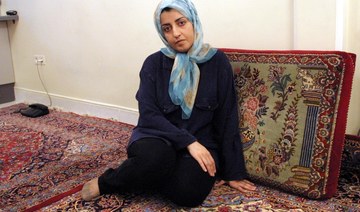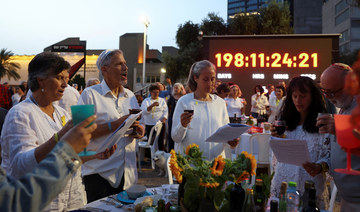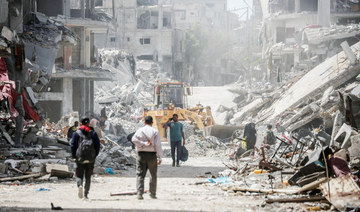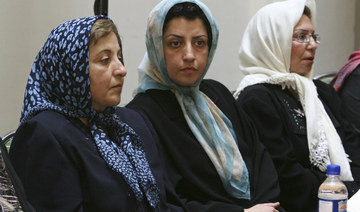JERUSALEM: Israel’s Arab coalition appears poised to emerge as the main opposition bloc following Tuesday’s election, a historic first that would grant a new platform to a long-marginalized minority.
Near-complete results Wednesday indicated the Joint List won about a dozen seats in the 120-member assembly, coming third after the Blue and White party of former military chief Benny Gantz and the right-wing Likud party of Prime Minister Benjamin Netanyahu.
In absolute terms, the Arab bloc appears to have met or fallen short of its performance in 2015, when it won 13 seats.
But this time around, due to the shifting constellation of Israeli politics, it would be well-placed to lead the opposition if a national unity government of the two largest parties is formed, as seems likely.
That would put a representative of Israel’s Arab citizens closer to the center of power than ever before and strengthen their ability to influence the national agenda.
A TARGET OF INCITEMENT
Israel’s Arab minority makes up about 20% of the population of 9 million, and is descended from Palestinians who stayed in Israel after it was established as a state in 1948. They officially enjoy full citizenship, including the right to vote, but they lived under martial law until 1966 and still suffer widespread discrimination.
Decades of marginalization have bred voter apathy, and in April’s elections more than half the Arab electorate stayed home. This time around, Arab leaders joined forces and mobilized turnout, vowing to topple Netanyahu and push for improvements in public services.
Arab citizens have close family, cultural and historical ties to Palestinians in the occupied West Bank and Gaza, and largely identify with the Palestinian cause. That has led many Israelis to view them as a fifth column and a security threat. Netanyahu has repeatedly branded them as terrorists and traitors in a bid to energize his right-wing base, in remarks widely condemned as racist incitement.
In the closing hours of the 2015 elections, Netanyahu warned that Arabs were voting in “droves.” This time around, he pushed for the placement of cameras at polling stations in Arab districts based on unfounded claims of widespread fraud, saying Arabs were trying to “steal” the election . Facebook suspended an automated chat function on his account for 24 hours last week after it published a post saying, “Arabs want to annihilate all of us.”
Netanyahu appeared to double down in his election-night speech, saying no Israeli government could include “anti-Zionist Arab parties” that “reject the very existence of Israel as a Jewish and democratic state” and “praise bloodthirsty terrorists who murder our soldiers, citizens and children.”
___
VICTORY AT THE POLLS
Netanyahu’s tactics appear to have backfired.
The increased turnout among Arab voters propelled the bloc to a strong showing and may have denied Netanyahu the right-wing coalition he had desperately sought.
“There is no other prime minister who incited against us like Netanyahu,” Ayman Odeh, the leader of the Joint List, told Israeli media as the initial results trickled in. “There’s a limit. The Arab citizens undoubtedly felt that they became a persecuted minority, an endangered minority.”
Arab leaders seemed to savor Netanyahu’s apparent comeuppance. “We voted in droves,” Ahmad Tibi, an Arab member of parliament, tweeted in Hebrew.
The Joint List is unlikely to sit in any Israeli government because that would entail endorsing military operations against the Palestinians. Many Jewish-majority parties still refuse to sit with Arabs as political partners.
But the Arab parties’ increased clout could allow them to block right-wing legislation like the law narrowly passed last year defining Israel as the nation-state of the Jewish people. An informal alliance supporting the ruling coalition from the outside could also help deliver legislation to improve housing, education and law enforcement in long-marginalized Arab communities.
The Arab bloc is also expected to advocate for a two-state solution to the conflict with the Palestinians at a time when none of Israel’s main parties has made the peace process a priority.
___
A NEW PLATFORM
Neither Gantz nor Netanyahu have enough support to form a government without the Yisrael Beitenu party led by Avigdor Lieberman, who has emerged as kingmaker .
Lieberman, a right-winger with a history of incendiary remarks about Arabs, has demanded a national unity government with Likud and Blue and White. That would leave the Joint List as the largest party outside the government and make Odeh Israel’s first-ever Arab opposition leader.
In his official duties as opposition leader, Odeh would hold monthly consultations with the prime minister and meet with visiting dignitaries. He would be granted a state-funded bodyguard, access to high-level security briefings and an official platform to rebut the prime minister’s speeches in parliament.
“This is a very significant, unprecedented level for us,” Odeh told Army Radio. “When presidents from around the world come they’ll meet with us as well.” He has described the prospect of an Arab leader receiving security briefings as “interesting.”
Odeh says his bloc also mobilized support from Israeli Jews, some of whom welcomed its success.
Nahum Barnea, a prominent columnist with Israel’s main daily Yedioth Ahronoth, said the Joint List’s achievement should be measured not in the number of seats it won but in “its ability to build bridges to the mainstream of Israeli politics and society.”
“It is unthinkable to continue to exclude and to humiliate forever 20% of the electorate,” he wrote. “Their expectations in all that pertains to integration, influence and respect all emanate from the ground up. Those expectations have to be met somehow.”
Israel’s Arabs poised to gain new voice after tight election
Israel’s Arabs poised to gain new voice after tight election
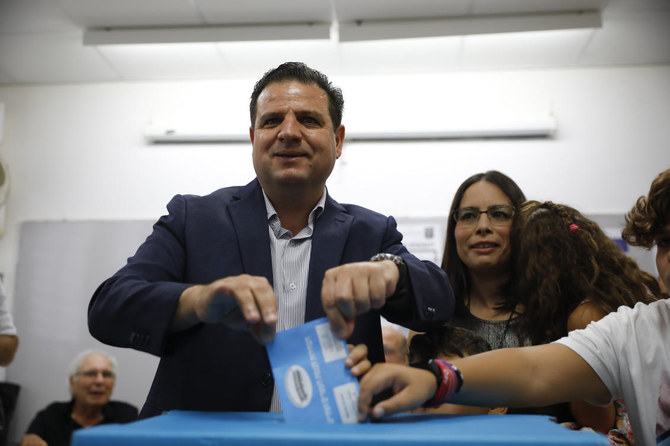
- The Arab bloc appears to have met or fallen short of its performance in 2015, when it won 13 seats
Tent compound rises in Khan Younis as Israel prepares for Rafah offensive
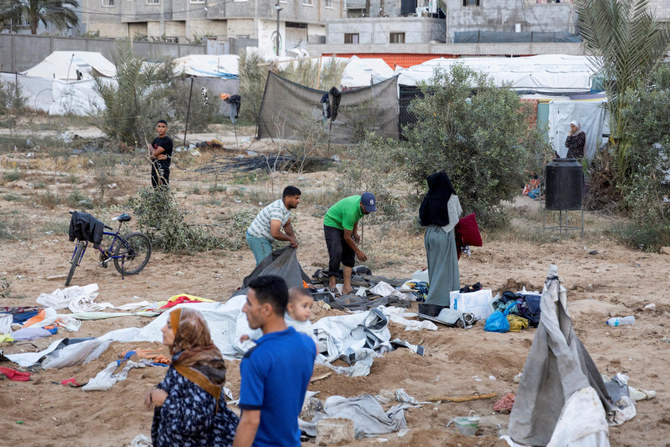
- Israel has said it plans to evacuate civilians from Rafah during an anticipated offensive on the southern city
- The Israel-Hamas war has killed more than 34,000 Palestinians
The tent construction is near Khan Younis, which has been targeted by repeated Israeli military operations over recent weeks. Israel has said it plans to evacuate civilians from Rafah during an anticipated offensive on the southern city, where hundreds of thousands of people have taken refuge during the war, now in its seventh month.
Also Monday, a failed rocket strike was launched at a base housing US-led coalition forces at Rumalyn, Syria, marking the first time since Feb. 4 that Iranian-backed militias have attacked a US facility in Iraq or Syria, a US defense official said. No personnel were injured in the attack, and no group has claimed responsibility for the attack.
The conflict has sparked regional unrest pitting Israel and the US against Iran and allied militant groups across the Middle East. Israel and Iran traded fire directly this month, raising fears of all-out war.
The war was sparked by the unprecedented Oct. 7 raid into southern Israel in which Hamas and other militants killed around 1,200 people, mostly civilians, and abducted around 250 hostages. Israel says militants are still holding around 100 hostages and the remains of more than 30 others.
The Israel-Hamas war has killed more than 34,000 Palestinians, according to local health officials, at least two-thirds of them children and women. It has devastated Gaza’s two largest cities and left a swath of destruction. Around 80 percent of the territory’s population have fled to other parts of the besieged coastal enclave.
The US House of Representatives approved a $26 billion aid package on Saturday that includes around $9 billion in humanitarian assistance for Gaza, which experts say is on the brink of famine, as well as billions for Israel. The US Senate could pass the package as soon as Tuesday, and President Joe Biden has promised to sign it immediately.
Iran’s foreign minister calls EU sanctions ‘regrettable’
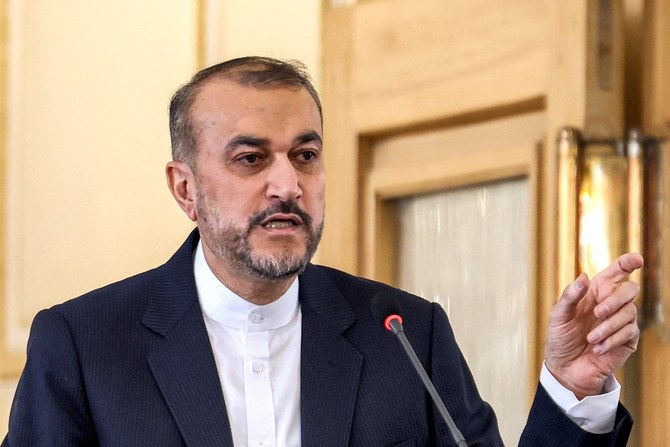
- EU foreign ministers agreed in principle to expand sanctions on Iran by agreeing to extend restrictive measures on Tehran’s weapons exports
DUBAI: European Union sanctions announced following Iran’s attack against Israel are “regrettable” because the country was acting in self-defense, Iran’s Foreign Minister Hossein Amirabdollahian posted on X on Tuesday.
Iran launched more than 300 drones and missiles on Israel in what it said was retaliation against a suspected Israeli bombing of its embassy compound in Damascus.
On Monday, EU foreign ministers agreed in principle to expand sanctions on Iran by agreeing to extend restrictive measures on Tehran’s weapons exports of any drone or missile to Iranian proxies and Russia.
“It is regrettable to see the EU deciding quickly to apply more unlawful restrictions against Iran just because Iran exercised its right to self-defense in the face of Israel’s reckless aggression,” Amirabdollahian said on X, before calling on the EU to apply sanctions on Israel instead.
More work will need to follow in Brussels to approve a legal framework before the expansion of the sanctions can take effect.
Israel’s Gaza war has negatively impacted human rights, says US report

- Rights issues include credible reports of unlawful killings, enforced disappearances and torture, says report
- Israeli military's conduct has come under scrutiny as its forces have killed over 34,000 in Gaza since Oct. 7
WASHINGTON: The war between Israel and Hamas that has killed tens of thousands of Palestinians in Gaza and resulted in a severe humanitarian crisis has had “a significant negative impact” on the human rights situation in the country, the US State Department said in its annual report on Monday.
Significant human rights issues include credible reports of arbitrary or unlawful killings, enforced disappearance, torture and unjustified arrests of journalists among others, said the State Department’s 2023 Country Reports on Human Rights Practices.
The report added that the Israeli government has taken some credible steps to identify and punish the officials who may have been involved in those abuses.
Israel’s military conduct has come under increasing scrutiny as its forces have killed 34,000 Palestinians in Gaza, according to the enclave’s health authorities, many of them civilians and children. The Israeli-occupied Gaza Strip has been reduced to a wasteland, and extreme food shortages have prompted fears of famine.
Israel launched its assault in response to a Hamas attack on Oct. 7, in which Israel says 1,200 people were killed.
Rights groups have flagged numerous incidents of civilian harm during the Israeli army’s offensive in Gaza, as well as raised alarm about rising violence in the Israeli-occupied West Bank, where Palestinian Health Ministry records show Israeli forces or settlers have killed at least 460 Palestinians since Oct. 7. But so far the Biden administration has said it has not found Israel in breach of international law.
Washington gives $3.8 billion in annual military assistance to its longtime ally. Leftist Democrats and Arab American groups have criticized the Biden administration’s steadfast support for Israel, which they say provides it with a sense of impunity.
But this month, President Joe Biden for the first time threatened to condition support for Israel, and insisted that it take concrete steps to protect humanitarian aid workers and civilians.
Israel’s Gaza war has negatively impacted human rights, says US report
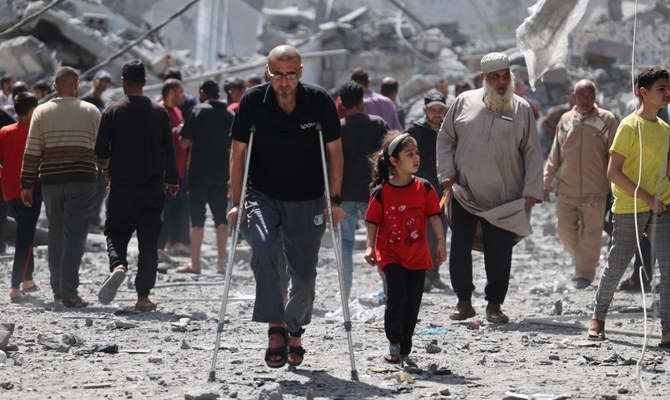
- The Israeli-occupied Gaza Strip has been reduced to a wasteland, and extreme food shortages have prompted fears of famine
WASHINGTON: The war between Israel and Hamas that has killed tens of thousands of Palestinians in Gaza and resulted in a severe humanitarian crisis has had “a significant negative impact” on the human rights situation in the country, the US State Department said in its annual report on Monday.
Significant human rights issues include credible reports of arbitrary or unlawful killings, enforced disappearance, torture and unjustified arrests of journalists among others, said the State Department’s 2023 Country Reports on Human Rights Practices.
The report added that the Israeli government has taken some credible steps to identify and punish the officials who may have been involved in those abuses.
Israel’s military conduct has come under increasing scrutiny as its forces have killed 34,000 Palestinians in Gaza, according to the enclave’s health authorities, many of them civilians and children. The Israeli-occupied Gaza Strip has been reduced to a wasteland, and extreme food shortages have prompted fears of famine.
Israel launched its assault in response to a Hamas attack on Oct. 7, in which Israel says 1,200 people were killed.
Rights groups have flagged numerous incidents of civilian harm during the Israeli army’s offensive in Gaza, as well as raised alarm about rising violence in the Israeli-occupied West Bank, where Palestinian Health Ministry records show Israeli forces or settlers have killed at least 460 Palestinians since Oct. 7. But so far the Biden administration has said it has not found Israel in breach of international law.
Washington gives $3.8 billion in annual military assistance to its longtime ally. Leftist Democrats and Arab American groups have criticized the Biden administration’s steadfast support for Israel, which they say provides it with a sense of impunity.
But this month, President Joe Biden for the first time threatened to condition support for Israel, and insisted that it take concrete steps to protect humanitarian aid workers and civilians.
Nobel laureate urges protest against Iran’s ‘war on women’
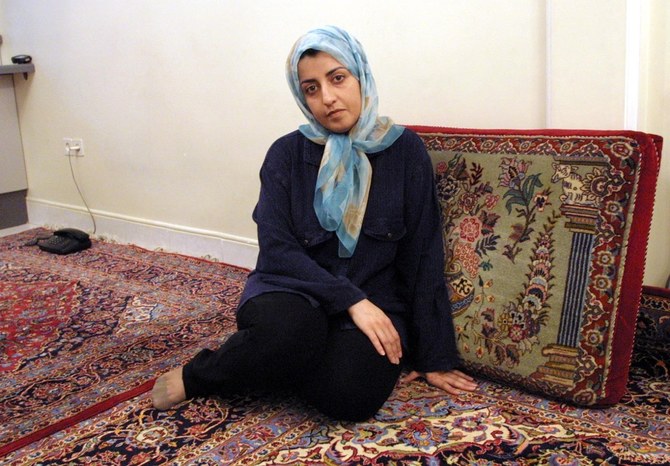
- Narges Mohammadi issues plea from Evin prison amid new crackdown by Tehran’s morality police
JEDDAH: Jailed Iranian Nobel laureate Narges Mohammadi urged Iranians on Monday to protest against the clerical regime’s “war against women” amid a new crackdown forcing women to cover their heads.
Mohammadi, who is being held in Evin prison in Tehran, called on Iranian women to share their stories of arrest and sexual assault at the hands of the authorities.
Iran launched a nationwide operation this month to enforce the wearing of the headscarf. Women have been arrested and taken to police stations by the morality police, and the Farsi hashtag meaning “war against women” has been trending on social media.
“People of Iran, I ask you, artists, intellectuals, workers, teachers, and students ... inside and outside the country to protest against this war against women,” Mohammadi said in a message from inside the prison. “Do not underestimate the power of sharing your experiences. Doing so will expose the misogynistic government and bring it to its knees.” She accused the authorities of bringing “a full-scale war against all women to every street in Iran.”
Mohammadi said she had been joined in jail by Dina Ghalibaf, a journalist and student who was arrested after accusing security forces on social media of putting her in handcuffs and sexually assaulting her during a previous arrest at a metro station. “For years, we have witnessed many women who have endured assault, abuse, and beatings by government agents,” Mohammadi said.
Mohammadi, 52, was awarded the Nobel Peace Prize last year in recognition of her campaign for human rights in Iran, which has led to her spending much of the past two decades in and out of jail. She has been imprisoned since November 2021 and has not seen her husband and twin children, who live in Paris, for several years.





